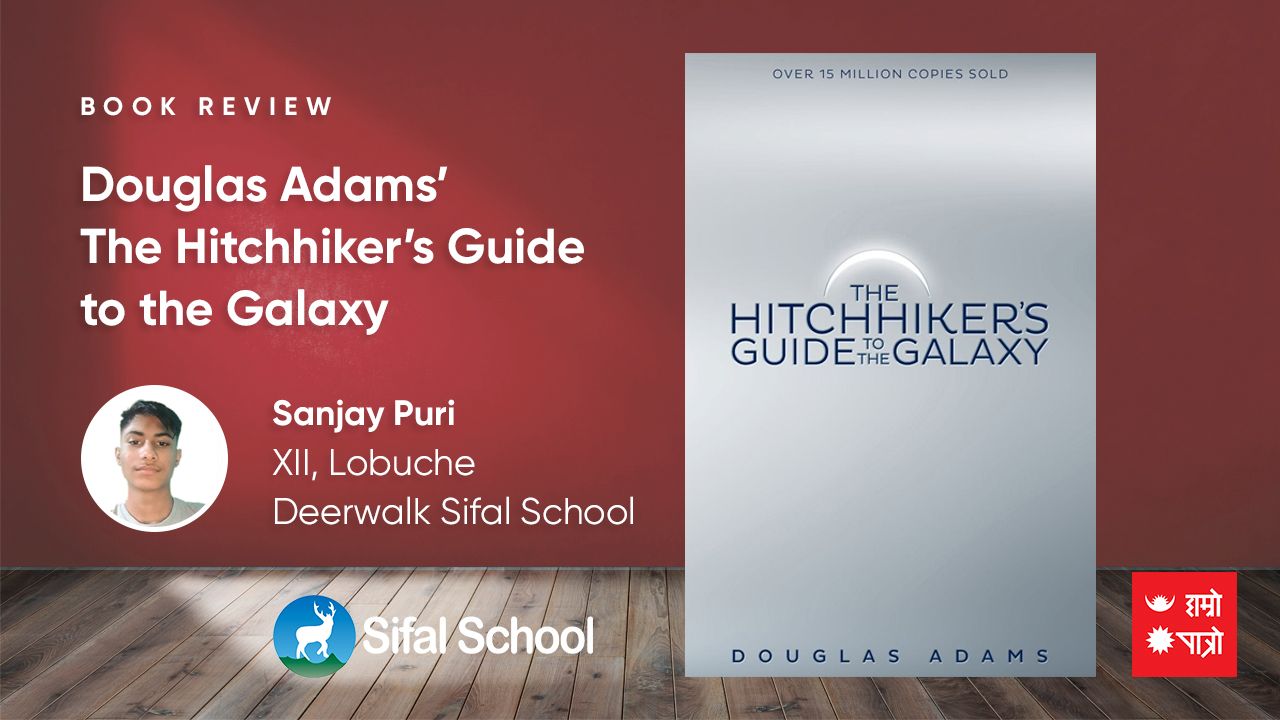
 Sanjay Puri - May 31 2023
Sanjay Puri - May 31 2023 The Hitchhiker's Guide to the Galaxy is Douglas Noel Adams' (11 March 1952–11 May 2001) best-known work as an author and screenwriter in England. The Hitchhiker's Guide to the Galaxy, which began as a BBC radio comedy in 1978, eventually expanded into a "trilogy" of five volumes and more than 15 million copies were sold throughout his lifetime. Additional adaptations included a television series, many theatrical productions, comic books, a video game, and a 2005 feature film. The Broadcasting Academy's Hall of Fame recognizes Adams' service to UK radio.
The Long Dark Tea-Time of the Soul (1988), Dirk Gently's Holistic Detective Agency (1987), The Meaning of Liff (1983), The Deeper Meaning of Liff (1990), and Last Chance to See (1983) are more works by Adams (1990). He co-wrote City of Death (1979), co-wrote two stories for the Doctor Who television series, and worked as script editor for the seventeenth season. He co-wrote the Monty Python's Flying Circus skit "Patient Abuse" for the episode's conclusion. The Salmon of Doubt, a posthumous collection of his chosen works that included the first release of his final (unfinished) novel, was released in 2002.
Adams was a proponent of environmentalism and conservation, a self-described "radical atheist," and a fan of cutting-edge technology, fast vehicles, and the Apple Macintosh.
The sixth novel, The Hitchhiker's Guide to the Galaxy, written by Eoin Colfer, is the first book in Douglas Adams' comedy science fiction "trilogy of five books" named The Hitchhiker's Guide to the Galaxy. The story chronicles the exploits of the lone survivor after the destruction of Earth as he journeys through space and learns the purpose for Earth's existence. It is based on the first four episodes of Adams's radio series of the same name. The book was first published on October 12th, 1979, in London. 250 000 copies were sold throughout the first three months.
At the beginning of the book, The Hitchhiker's Guide to the Cosmos—which includes details about every planet in the galaxy—is also introduced, along with a description of humanity as a helpless and miserable species. When Earthman Arthur Dent discovers that his West Country, England, home is being attempted to be destroyed in order to build a bypass, he lays down in front of the bulldozer to stop it. Ford Prefect, Arthur's friend, convinces Mr. Prosser, the senior bureaucrat, to lie down in front of the bulldozer for Arthur so that they can go to the local bar together.Despite this, the demolition team begins to knock down the house, but they are forced to stop when a fleet of extraterrestrial spacecraft covertly touch down on Earth without being detected by human space agencies. The fleet is commanded by the ruthless Vogons, who openly declare their intention to destroy Earth in order to construct a hyperspace expressway before carrying it out. Arthur is shocked to learn that Ford and Arthur survive by entering the spacecraft. Ford tells Arthur that he has been impersonating an unemployed actor from Guildford for the past 15 years while really working as an alien researcher for the Hitchhiker's Guide to the Galaxy from a small planet close to Betelgeuse. As a result, they were able to board the alien ship. The novel is filled with bizarre circumstances, funny remarks, and humorous incidents. Adams' distinctive and witty writing style captivates and entertains the reader throughout the entire book. The characters in the novel are both endearing and eccentric, and the humor is both witty and bizarre.
One of "The Hitchhiker's Guide to the Galaxy's" greatest assets is its capacity to blend humor and science fiction in a way that appeals to readers of all ages. The book is not mired down with technical language, but instead, it concentrates on the absurdity and humor of the cosmos. The narrative makes readers laugh while also making them reflect on life's greater questions and the nature of the cosmos in general.
For science fiction aficionados and everyone who appreciates a good laugh, "The Hitchhiker's Guide to the Galaxy" is a must-read. Readers will be enthralled by Douglas Adams' wonderfully original and delightful cosmos and eager for more.The book has stood the test of time and remains a classic in the science fiction genre.
Despite the book's many advantages, there are a few problems worth pointing out. First off, the plot may occasionally go off course and the narrative frequently feels episodic rather than cohesive. Not everyone will enjoy the humor, and some readers could find the book's absurdist tone to be too absurd for their tastes. All things considered, the science fiction classic "The Hitchhiker's Guide to the Galaxy" deserves its reputation as a must-read for fans of the genre. It is a work that may be enjoyed on a variety of levels because of its sharp wit, astute observations, and intricate world-building.
Sanjay Puri
Grade: XII, Lobuche
Genre: Science Fiction
Published on: October 12, 1979
Liked by: